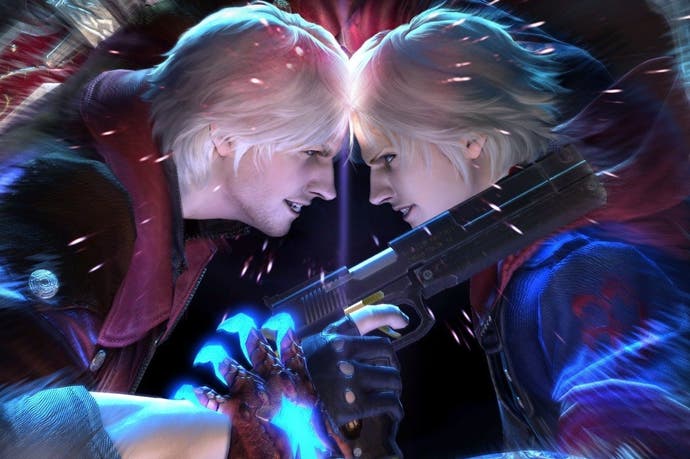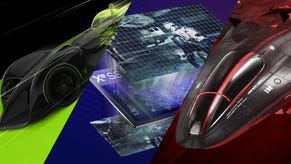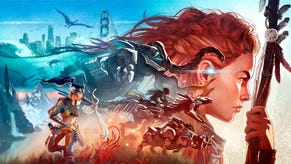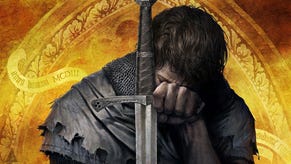Face-Off: Devil May Cry 4: Special Edition
Devil's advocate.
We're halfway through Capcom's 'Year of the Remaster' - Devil May Cry 4: Special Edition is the third of five revisitations of older titles due this year, with Resident Evil Zero and the Mega Man Legacy Collection still to come. As one of the earlier games created using Capcom's MT Framework engine, the original DMC4 was quite a looker back in early 2008. Now, more than seven years later, do those once cutting-edge visuals still make the grade on newer hardware and have any new issues appeared in the transition? Given Capcom's somewhat spotty remaster track record, we tackled this latest release with some trepidation.
Perhaps the most important element in any Devil May Cry title is its performance. Ask any hardcore fan of the series and they'll tell you how critical a fast frame-rate is for high level play - something Ninja Theory was blasted for in the last generation with its 30fps take on the franchise. High-level play demands fast input response and an unwavering frame-rate. Thankfully, in our testing, both PS4 and Xbox One turned in excellent performance overall, delivering a smooth, stable 60fps for the vast majority of the duration. In fact, frame-rate on the whole is actually more consistent here than it was in its original console incarnation.
Unfortunately, for those interested in ramping up the experience to the next level, there is a caveat - there are slight performance issues on Xbox One when playing Legendary Dark Mode. This is an challenging gameplay mode previously introduced in the original PC version of the game that throws a much larger number of foes at the player. More than any other mode, this setting demands a perfect frame-rate - something that the Xbox One can't quite provide in all instances. Essentially, we're looking at minor dips into the mid-50s - something that is just enough to interrupt fluidity. By comparison, these same sequences play without issue on PlayStation 4.
On the PC side it should come as no surprise that this version is just as optimised as the original release, with our i5/GTX780 setup able to hit the target frame-rate with ease at 1440p with 8x MSAA enabled. No matter what we threw at the game it simply refused to drop a frame. That said, requirements have increased a bit from the original release as a result of the new visual effects. For example, a low-end Radeon 7770 setup was unable to hold a completely stable 60fps at the highest settings, while the same system had no issues with the original PC version of the game - something users of lower-end gaming laptops might like to factor into their thinking.
Alternative analysis:
Capcom has something of a poor track record in releasing issue-free remasters on PlayStation 4, and DMC4: Special Edition is no exception - but thankfully the problem here is minimal and doesn't impact gameplay. Essentially we're looking at an issue with cut-scene playback in which a single duplicate frame appears every 60 seconds or so, resulting in subtle but constant hitches. The effect is similar to the issue we encountered with last year's Mario Kart 8 and basically hinders fluidity. Fortunately this issue only appears during these non-interactive scenes preventing it from becoming a real hindrance. In any case, cut-scenes now display at 60fps (or perhaps 59fps in the case of PS4) in all three versions whereas the original console release was much less fluid. In that sense it's an improvement across the board.
Image quality-wise, both console versions run at a full 1920x1080 resolution but lack any form of anti-aliasing. This is a bit alarming considering that even the original Xbox 360 version utilised hardware multi-sampling - MSAA. Fortunately, the overall presentation is still acceptable as a result of the game's art direction, which avoids the use of high-contrast shaders and thin lines. It could be improved but during actual gameplay, image quality is still acceptable. It should also be noted that a reasonable level of texture filtering is applied on both systems, unlike the initial release of DmC Devil May Cry on PS4 earlier this year.
Expectedly, this is not a problem on PC, which offers a range of MSAA options in addition to support for higher resolutions. The game supports Nvidia DSR for all your downsampling needs but appears to be limited to specific standardised resolutions such as 2160p. We were able to enjoy the game at 4K with MSAA disabled without a performance penalty, but feel that 2560x1440 with 8x MSAA actually produces a more pleasing overall image, and retained its locked 60fps on the GTX 780.
Aside from the expected image quality and performance boosts, additional visual enhancements are included in the Special Edition. For starters, full object motion blur has been added to the mix, accentuating the game's explosive animations. This effect was previously utilised in the game's cut-scenes but is enabled throughout the game in this new release. Due to the performance issues with the original game's cut-scenes it's easy to imagine that this feature was originally disabled to allow for 60fps on PS3 and Xbox 360. It's a worthy addition to the Special Edition, bringing a newfound sense of fluidity to every move.
Screen-space light shafts have also made the cut this time out. Previously, the game displayed a simplistic sun glare effect but now we see god rays peeking around columns and through windows, creating an extra layer of visual depth. Textures are apparently improved as well, having been sourced from the original PC port, but in most cases the assets in question simply appear artificially sharpened. Lastly, we also noticed improvements made to various surface shaders such as water and ice.
This does introduce one minor problem that we didn't expect - missing shadows in select scenes. Simply put, shadow maps now abruptly end at points where they intersect with a body of water. Furthermore, pools of water now intersect world geometry in a slightly less attractive manner, lacking the slight transparency present in the original. It's a situation that doesn't arise often, but it does hurt scene consistency just a bit in those moments. We can imagine that tinkering around with the game's assets is to blame for this.
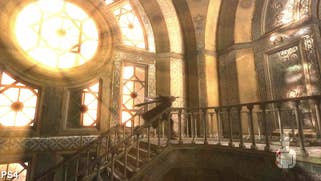
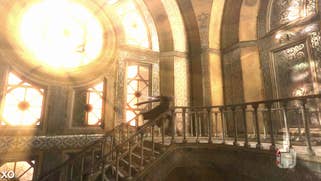

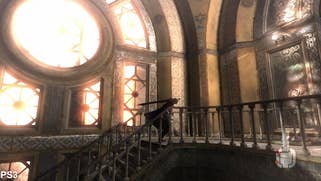

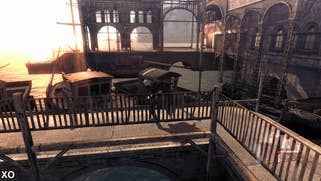

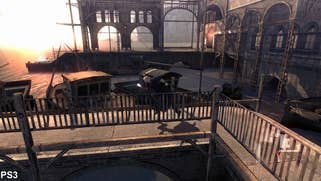
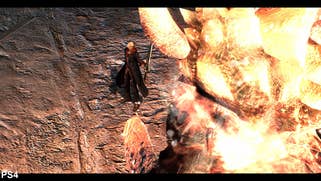
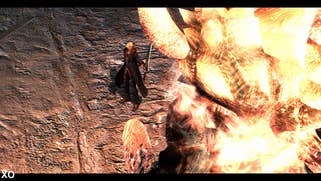
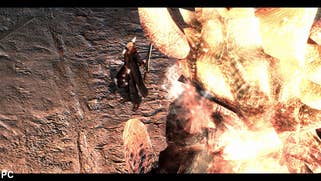

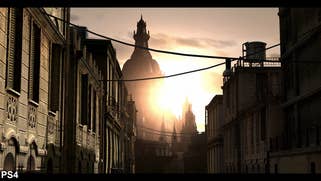
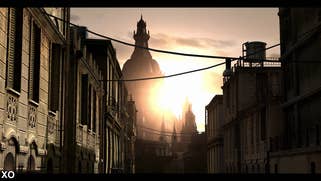
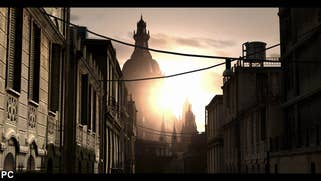

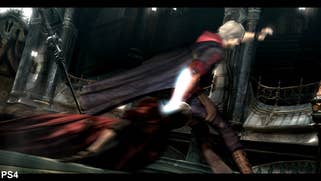
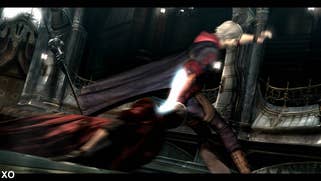
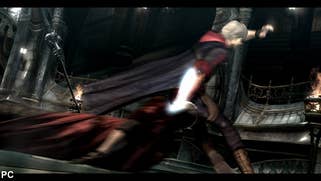
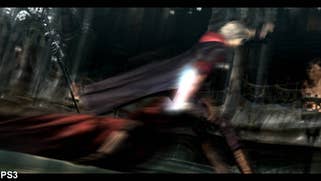
Other improvements focus more on the user experience. For starters, completing a mission no longer requires the user to save manually thanks to the inclusion of an auto-save feature. The game also includes fully customisable control settings, even going so far as to allow players to save a unique preset for each character. It's a feature we'd love to see more often. The developers even went so far as to offer a Japanese language track in this version of the game - a first for the series.
Devil May Cry 4: Special Edition - the Digital Foundry verdict
Ultimately, Devil May Cry 4: Special Edition is a fairly straightforward release that allows users of current generation consoles a chance to revisit the game with a number of improvements. The added content, improved visuals, and new options are all worthwhile additions, and while the level design feels a bit dated, the core gameplay remains excellent. It should also be noted that while this is a digital release in the West, the game is available as a retail product in Japan and other Asian countries, so if you're a collector looking for the definitive version of DMC4, there are options out there. The retail versions of the game are region free and include English language support.
As for which version to consider, it's pretty clear that the PC version comes out on top in terms of technical performance. Support for higher resolutions and hardware MSAA combine with excellent performance on a wide range of hardware to create a wonderfully polished experience from top to bottom - just don't plan on playing the game with a mouse and keyboard if you decide to go down that route. Between the two console versions, it's easy to imagine that casual users would be happy either way since they both offer a nice improvement over the original release. That said, we have a real preference for the PlayStation 4 version due to flawless in-game performance in all modes and the more comfortable R1 and L1 buttons. Even considering these minor quibbles, Devil May Cry 4: Special Edition is perhaps the highest quality remaster Capcom has released this year - regardless of platform.
